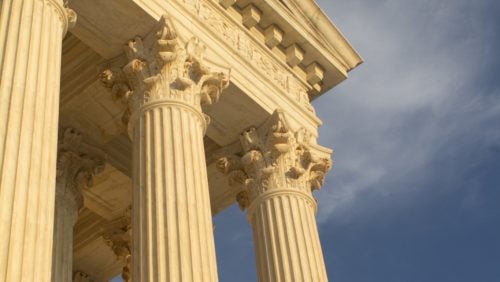Georgetown Law Dean William M. Treanor Files Amicus Brief in Supreme Court Case on Federal Election Oversight
December 5, 2022

Update: On June 27, 2023, the Supreme Court issued its decision in Moore v. Harper, rejecting the “independent state legislature doctrine.” Chief Justice John G. Roberts, in his majority opinion, cited a 2005 Stanford Law Review article by Dean William M. Treanor, “Judicial Review Before Marbury.” In this Q&A from December 2022, Treanor explained how such scholarship led him to file an amicus brief in support of the view that the nation’s founders intended for state supreme courts to have authority over a state’s election laws.
On December 7, the Supreme Court will hear arguments in Moore v. Harper, a case that will determine the role of state courts in reviewing state laws regulating federal elections. The case, closely watched by voting rights activists and both political parties, will determine whether a new congressional district map drawn by the North Carolina legislature but later declared invalid by the North Carolina Supreme Court will go forward as drawn.
The arguments in Moore v. Harper pivot on the legitimacy of the “independent state legislature doctrine,” whose proponents hold that the U.S. Constitution gives state legislatures, not state courts, the final say in conducting elections for the U.S. House of Representatives and U.S. Senate. Georgetown Law Dean William M. Treanor, a Constitutional historian, filed an amicus brief rejecting this theory and supporting the view that the Founders always intended for state supreme courts to review state election laws.
We asked Treanor about how this case caught his eye and about why he believes the respondents – a coalition of North Carolina voters and voting rights groups who initially sued to block what they argued was an illegally gerrymandered redistricting plan – should prevail.

Georgetown Law Dean William M. Treanor
Q: How does this case intersect with your scholarly interests?
A: This is a case that is being fought on the grounds of what the original understanding of judicial review was. I have written a great deal on that topic – including my doctoral dissertation and many articles. I wanted to write an amicus brief because one side is clearly right in Moore, and one side is clearly wrong, but neither side was bringing to bear the rich – and relevant – early case law. That is my expertise, so I thought it was important to contribute a brief that draws on my research.
Q: As a historian focused on how the Founders understood and defined judicial review, what information does your brief provide that could be helpful to the Justices in analyzing this case?
A: Two things:
First, state court judicial review of state statutes was well-established at the time of the founding. Most people – including courts – think judicial review was created by Chief Justice John Marshall in Marbury v. Madison in 1803. It wasn’t. In fact, twenty years before Marbury, the leading Virginia judges announced that they had the power of judicial review. One of the judges was Marshall’s law teacher and, at least according to legend, Marshall was in the courtroom when the decision was announced.
Second, state courts’ power to review state legislation included review of voting legislation, which is the subject of Moore. The judge who wrote the opinion that makes this point was Justice William Paterson, an early Supreme Court Justice and someone who had been a major figure at the constitutional convention.
Q: Is this an “originalist” argument you are making?
A: Yes. That is clearly what the Court is concerned with in this case. I am also an originalist so it is easy for me to make an originalist argument that I believe in.
Q: Do you have any sense of how the Justices may rule?
A: I don’t know. Three Justices (Justices Alito, Gorsuch and Thomas) have suggested that they will rule on behalf of the state legislature. One (Justice Kavanaugh) has indicated that the state legislature’s arguments are serious, although he hasn’t yet embraced the position of the other three. So, the state legislature is starting from a strong position in terms of vote, but we don’t know what the ultimate outcome will be.
Q: How significant is this case?
A: This is a very important case – in part because it directly bears on the federal constitutional provision that governs state legislation creating congressional districts. The Court’s opinion may permit state legislatures to gerrymander congressional districts without oversight by state courts.
Even more important, it may bear on the provision of the federal constitution about state legislation affecting presidential elections. Conceivably, depending on the outcome in Moore, the Court might pave the way for state legislatures to decide they can choose presidential electors – even if the state courts would say that the state constitution requires that electors be determined by the popular vote in the state. That may crucially affect the 2024 presidential election, giving state legislatures control of the state’s electoral votes.